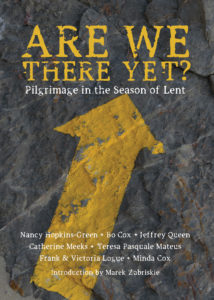 The following excerpt is from our Lenten offering, Are We There Yet? This thought-provoking book explores the idea of pilgrimage as a metaphor for the Lenten journey. The contributing writers share stories of physical pilgrimages to beloved sites in the Christian tradition as well as internal journeys of the soul. Regardless of the type of pilgrimage, the journey radically changes each person. The pilgrims who have contributed to this Lenten devotional share this truth of transformation in stories of their own personal journeys. This excerpt was written by Bo Cox.
The following excerpt is from our Lenten offering, Are We There Yet? This thought-provoking book explores the idea of pilgrimage as a metaphor for the Lenten journey. The contributing writers share stories of physical pilgrimages to beloved sites in the Christian tradition as well as internal journeys of the soul. Regardless of the type of pilgrimage, the journey radically changes each person. The pilgrims who have contributed to this Lenten devotional share this truth of transformation in stories of their own personal journeys. This excerpt was written by Bo Cox.
When I was approached to write for this Lenten devotional, I hesitated. I told the editor that I didn’t feel very connected to Christianity these days. It seems to me that the religion named after Jesus has become more exclusive than inclusive. It feels like it’s become more about prosperity and “what’s in it for me” than brokenness and welcoming the stranger, feeding and clothing the poor, and visiting those in prison. Further, the church seems to be consciously (or subconsciously) tolerating a governmental system that leads the world in incarcerating its citizens. This, the editor said, was exactly why I needed to write. So I accepted the invitation.
I don’t identify with mega-churches, prosperity theology, or a way of life that is more about what I get when I die than how I behave when I’m alive and how I treat those around me—especially those with less or those who don’t look like me or believe like me.
I seek the sacred word of God—in the Bible, the Koran, the Torah, written on parchment paper, drawn in the sand, or heard in the wind through the trees, uttered by a robed official of the church, a sweat lodge leader, an imam, or a bedraggled patient at the psychiatric hospital where I work. Writer Anne Lamott says simply, “We can assume we have created God in our own image when it turns out that he hates the same people we do.” I would add to that: “I can assume I have created God in my own image when I think I understand God.”
Today’s scripture from Ezra is about rebuilding the house of the Lord. The dictionary says rebuild means to build something again after it has been damaged or destroyed, and the authors of the Old Testament have a pretty concise idea about what this rebuilt structure should look like. I am not an authority on anything, certainly not rebuilding a temple. I do, however, have a little experience with rebuilding a broken human, along with an alternative understanding of the God who makes this possible.
What I know has little to do with wealth or material possessions but has much to do with vulnerability and accepting one’s brokenness. My education into rebuilding a broken human has more to do with muddy feet than golden carpet, with stumbling, not surefootedness, with need rather than entitlement, with being left off the invitation list (and being let in anyway) instead of being on the VIP list to begin with. What I have learned is that rebuilding a temple in our hearts has more to do with bad coffee, hand-me down clothes, and honest souls in musty church basements than prime rib dinners at five-star restaurants where lobbyists and politicians make million-dollar deals to benefit the already-wealthy at the expense of those crushed by poverty. Rebuilding the temple in our hearts has more to do with social workers who toil on the brink of that same poverty than administrators looking to retire early with a full portfolio of stock options.
Ezra’s lesson talks about the stockpile of wealth being a tower of material proof that God is good—and we are thankful. It also implies that wealth is a measure of favor and, therefore poverty must be anything but God-like.
The tower I see looks a lot more like a soup kitchen than a palace; it looks a lot more like crumpled sheets on a lopsided cot in a homeless shelter than starched sheets in a king-size suite in a luxury hotel. My tower looks more like a young forest of trees planted by people who will never see them reach maturity than a city block cleared for another million-dollar church where all the pretty people go to be told God wants them to have lots of money and fancy cars.
This week, we are not talking about a physical journey. This week will be about being still, about the journey within, about looking at ourselves in the mirror and seeing the image of God. I will share stories that illustrate God’s promise that just because something looks this way today doesn’t mean that the promise will always look that way. I want to talk about the difference between bad days when it feels like no one appreciates me and everything goes wrong, and good days when I am tearfully aware of how fortunate I am to be alive—and how this difference is simply my attitude and perspective. We will also talk about how it is not a coincidence that dog is God spelled backward.
-Bo Cox




